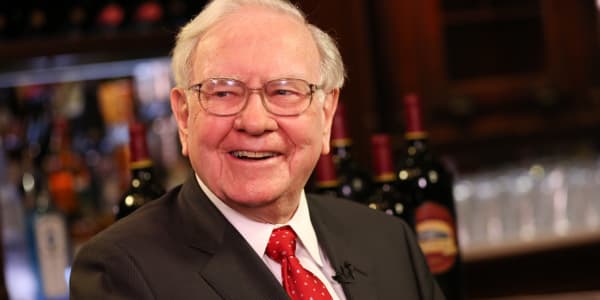
Warren Buffett said Monday morning that he wouldn't sell any stocks based on the terrorist attacks in Paris. And in recent years, global events have become more important for the quintessential all-American investor. The Berkshire Hathaway chairman and CEO has been pursuing more global deals and European investments in particular.
In the 2014 letter written to shareholders on the future of Berkshire Hathaway, Buffett stated, "The U.S. economy will ebb and flow — though mostly flow — and when it weakens, so will our current earnings. But we will continue to achieve organic gains, make bolt-on acquisitions and enter new fields. ... In most years, moreover, our country's economy will provide a strong tailwind for business. We are blessed to have the United States as our home field."
After six-plus years of a bull market in U.S. stocks, more investors are anxious to diversify their portfolios overseas beyond the U.S. home field, so it's worth taking a look at how Buffett has gradually gone global.
The biggest bet Buffett has made on a broad recovery in the European economy — and distinct from his large holdings in reinsurance companies based in Europe — was Berkshire's €400 million deal to buy German-based motorcycle accessory maker Detlev Louis Motorradvertriebs GmbH earlier this year.
Lawrence Cunningham, a George Washington University law professor and author of "Berkshire After Buffett," said the bet is part of a model eyeing the large number of closely held companies in Europe, many formed after World War II. They may turn to Berkshire as an acquirer that will supply capital and let founding families continue to run their businesses almost undisturbed.
It has taken Buffett this long to go global because his way of doing business depends heavily on word of mouth and on sticking to what he knows, Cunningham said. Berkshire Hathaway has never made a habit of scouting companies to acquire, preferring to respond to deal proposals brought to them by entrepreneurs. Most of those have come from Americans because Buffett's reputation is so large domestically, Cunningham said. But the widow of the German motorcycle company's founder had contacted Buffett first.
According to the 85-year-old Buffett, he and his 91-year-old top lieutenant, Charles Munger, also move slowly in new markets, where they need to learn about variations in consumer preferences and government regulations. That's one reason it took the company more than a year to do due diligence before it bought control of Israel-based Iscar Metalworking in 2008, Cunningham said.
"Buffett has hinted there will be a number of European deals," said Morningstar analyst Greggory Warren. "They're looking. It's about them getting comfortable with the deals and the markets.''
The pace of geographic diversification could be held back by the sheer size of Berkshire. In the U.S., it has recently eschewed the small deals for family-based companies that helped fuel its growth in decades past, because they are not enough to make a meaningful impact on overall profits.
Cunningham thinks that Buffett's team will relax that rule in Europe as it tries to gain a foothold, buying more companies like Detlev Louis as they become available. Morningstar's Warren expects deals in the $6 billion to $7 billion range, figuring they will be big enough to get Berkshire's attention while still having room to grow.
But it's difficult to handicap the industries in which Berkshire could acquire in Europe, because Berkshire has historically bought into so many different industries, Warren said. In addition, the hedge fund managers hired by Buffett in recent years to spearhead his stock investing, Ted Weschler and Todd Combs, may also be expanding their roles in guiding Berkshire's investments more broadly.
"Todd and Ted will make one, two or three little European acquisitions a year for 10 or 20 years, and you'll see a return,'' Cunningham predicted. "They'd never do this in the U.S., but now it's the kind of deal that gave Berkshire its [overseas] start."
Warren agreed that the two hedge fund managers "might be the catalyst that gets them to the next level" internationally.
U.S. revenue (%) of top Berkshire stock holdings
| Wells Fargo | 100 |
| U.S. Bancorp | 100 |
| Charter Communications | 100 |
| Wal-Mart Stores | 72 |
| American Express | 72 |
| Phillips 66 | 69 |
| General Motors | 61 |
| Coca-Cola | 46.7 |
| IBM | 34.5 |
| Dow Chemical | 33.4 |
Source: S&P Capital IQ (Data based on 2014 annual report and most recent quarterly revenue report. Coca-Cola revenue is for region reported by company as "North America"; IBM reports its "Americas" region; Dow Chemical reports its "North America" region.)
In Buffett's closely watched stock portfolio, there are only a few non-U.S.-based public companies Berkshire has taken big stakes in — but a long list of increasingly global businesses.
Three Berkshire top 15 holdings based in the U.S. receive less than 50 percent of revenue from North America: Coca-Cola, IBM and Dow Chemical.
The biggest overseas stock bet is French drug maker Sanofi Aventis, but it's not evident in Berkshire's quarterly stock filing how large that position is. Berkshire's 13F — the latest of which was released on Monday — shows an ownership position of roughly $200 million in Sanofi stock, and Berkshire has been a stockholder since 2006. But at the time of Berkshire's 2014 annual report — which also includes shares of overseas companies not held in ADR form, something not required of the 13F — Sanofi was among the 15 largest Berkshire holdings, with a portfolio value of more than $2 billion in stock. Just over one-third of Sanofi's sales are in the U.S., led by well-known sleep aid Ambien and cardiac-plaque fighter Plavix.
Traditional Buffett plays like Coca-Cola now get more than half of their sales and profits from outside the U.S., while Wal-Mart Stores — which Buffett reduced his stake in Monday to help pay for the acquisition of Precision Castparts — and American Express do more than a quarter of their business overseas. General Motors sells more cars in China than in the U.S. A more recent Buffett stockholding, DirecTV, has a Latin American business that generated $7.1 billion of the company's $33.3 billion in total 2014 revenue, an international-based advantage over some pay-TV competitors. DirecTV was recently acquired by AT&T, which appeared as a new Berkshire stock holding in the 13F filing released on Monday.
Buffett's 'top dog' bets
One of Buffett's longtime habits — investing in companies run by executives he admires — have made Berkshire's portfolio more global.
One example is Buffett's list of investments with pay-TV mogul John Malone. In addition to investing in Malone's Liberty Media, which controls Sirius XM radio and owns the Atlanta Braves, Berkshire holds a position worth about $900 million in Malone's Liberty Global, which sells mostly in Europe. DirecTV is another Malone-backed company, having ended up in the Colorado cable king's stable after he swapped a 16 percent chunk of Rupert Murdoch's News Corp. for a position in DirecTV that Malone later expanded to a controlling stake. Buffett does have a stake in Murdoch's Twenty-First Century Fox.
The relationship with Brazil-based 3G Capital and its co-founder Jorge Lemann is another example of Buffett investing through top executives he is confident in.
In an interview with CNBC earlier this year, David Rolfe, chief investment officer of Wedgewood Partners, said "that relationship can be multinational by design." Wedgewood counts Berkshire among its largest holdings. "I think the world is the oyster for 3G and Buffett these days, and if we click forward four to five years, if there isn't a significant acquisition on the international front, all would be concerned."
Rolfe specifically said the expectation will be deals beyond just the Americas. "This is new territory, and the size and scope of what these guys can do is minimum gazelle hunting but also elephant hunting," Rolfe said, referring to Buffett's famous quip that he has his "elephant gun" loaded for acquisitions.
Rolfe said there may be deals where Buffett is primarily serving as a financing arm but also receiving a significant equity component, which has been seen in the Kraft Heinz and Burger King deals overseen by 3G. "3G has global ambitions and incredible access to huge sums of capital that can make quick decisions. It will be interesting in the annals of Berkshire. 3G is a significant chapter," Rolfe said.
Berkshire's utility business owns a U.K-based power-distribution company that generated $1.28 billion of sales last year, and its General Re business is truly global, with 66 percent of sales in its life and health insurance business coming from outside the U.S. Reinsurance is one international focus for Buffett where he has been cutting back significantly on exposure. Buffett told CNBC on Monday that he is selling billions in Munich Re stock, which continues a recent pattern of negativity on the European-based reinsurers. "It's a business whose prospects have turned for the worse, and there's not much we can do about it," Buffett told shareholders at his company's annual meeting in May.
—By Tim Mullaney, special to CNBC.com





